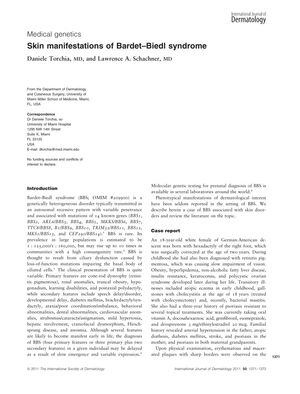Skin Manifestations of Bardet-Biedl Syndrome
October 2011
in “
International Journal of Dermatology
”

TLDR Bardet-Biedl syndrome may include under-recognized skin problems related to its metabolic disturbances.
The document discusses Bardet-Biedl syndrome (BBS), a rare, genetically heterogeneous disorder with variable penetrance associated with mutations in 14 known genes. BBS is characterized by primary features such as cone-rod dystrophy, renal anomalies, truncal obesity, hypogonadism, learning disabilities, and postaxial polydactyly, and secondary features like speech delay, diabetes mellitus, and others. The paper presents a case of an 18-year-old female with BBS who also had skin disorders, including psoriasis vulgaris and androgenetic alopecia related to polycystic ovarian syndrome. The patient's psoriasis was refractory to topical treatments, and she had a strong familial history of psoriasis. The paper suggests that while skin manifestations are not prominent in BBS, they may be under-recognized and could be related to metabolic/endocrine disturbances common in BBS, such as diabetes mellitus and obesity. The paper concludes that future studies are needed to determine if specific BBS gene defects trigger clinical subsets, including mucocutaneous disorders.






